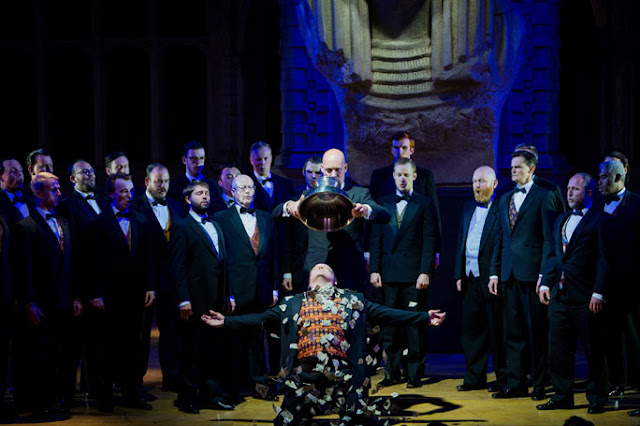 |
| Peter Auty, Graeme Broadbent - Aida - Opera Holland Park - photo Robert Workman |
Gweneth-Ann Jeffers, Peter Auty, Heather Shipp, Graeme Broadbent, Jonathan Veira, Keel Watson
Reviewed by Robert Hugill on Jun 26 2015
Star rating:
Strong musical performances and vivid drama in a production which re-works Aida for modern times
 |
| Gweneth-Ann Jeffers, Peter Auty photo Robert Workman |
Inevitably we could not expect pyramids, camels and large scale theatrical effects. But Daniel Slater’s production was certainly not without surprises. The basic set consisted of a museum-like using the Holland Park House façade as backdrop and with statues from Ancient Egypt in a museum display. During the prelude, the chorus in modern dress (dinner suits and long dresses) exploded onto the stage and the opening scene was a party. Clearly we were in a modern Kingdom, albeit one obsessed by the past as Radames was inducted as general by dressing him in Ancient Egyptian garb, and for much of the second half the populace were dressed in neo-Ancient Egyptian fancy dress. Aida was a cleaning lady, busy cleaning up after the party-goers. The production was secularised, with Ramfis becoming a rather nasty political fixer. But the production had more surprises for us, when the captured Ethiopians are brought on in a small huddle they were dressed as service workers – cleaning ladies, janitors etc. Were they real Ethiopian captives who had been dressed like that to demonstrate that they were unimportant, or was the war on invading ‘Ethiopians’ really a border war with illegal immigrants? It was never made clear, but I inclined to the latter (and other critics have come to different conclusions). Whichever, the Egyptians were displayed as rather vicious, selfish and unsympathetic.
But the removal religion from the plot, and the modernisation of the milieu also removed an essential element from the plot, the tension between public duty and private desires. In Daniel Slater's production I was not clear what Radames meant when he says he is renouncing his duty to his country, certainly he seemed to be emptying his wallet? The end result was gripping theatre, but it wasn't quite the Aida that Verdi envisaged.
 |
| Heather Shipp, Peter Auty photo Robert Workman |
The production worked because Opera Holland Park had assembled a strong and balance team of soloists under conductor Manlio Benzi. Whatever you thought of the ideas behind the production, the musical values were very high indeed and Daniel Slater had drawn vibrant performances from all concerned.
 |
| Heather Shipp photo Robert Workman |
If I said that Peter Auty’s Radames was a good steady portrayal of the hero, making him solid and dependable, then though sounds unexciting then it must be set into context of a role which few tenors today can sing with any degree of credit. Peter Auty gave a robust account of Celeste Aida with a climax which was secure, and expressive even if a trifle louder than ideal. But once past this hurdle he developed in strength, intensity and a feeling of the heroic, this was no stand and deliver performance.
 |
| Graeme Broadbent, Keel Watson photo Robert Workman |
Jonathan Veira made highly sympathetic Amonasro, bringing intensity to the role but he seemed to want to punch each note out so that his performance though vibrant rather lost any sense of line. He and Gweneth-Ann Jeffers poignantly brought out the tension in their relationship.
Graeme Broadbent's Ramfis was a far stronger personality, far more involved in the drama than is sometimes the case and he turned in a wonderfully vivid, at times alarming portrayal of a nasty piece of work. Keel Watson brought his large voice to bear on the King to create a really larger than life musical personality.
Emily Blanch made a fine impression in the small role of the priestess, now reduced simply to a cabaret vamp, and Peter Davoren was the messenger in Act One.
The chorus (chorus master Nicholas Jenkins), with no extra dancers involved in the production, were hard working and delivered a really strong musical performance throughout, singing with strong, vividly focussed tone. Whilst I might have had doubts about the staging of the Triumph scene, the quality of the musical and dramatic performance from the chorus was never in doubt. In the men only sections of the opera, the male chorus made a fine, firm sound and had a nice line in threatening behaviour. The women were seductive in the extreme in their scenes.
I was slightly worried about balance at first, as Manlio Benzi seemed to encouraging a strong and colourful account of the score from the orchestra but this settled down after a while and we were able to sit back and enjoy a vibrantly dramatic account of the score.
This review also appears in OperaToday.com.
Elsewhere on this blog:
- Virtuosity with a human touch: My encounter with Matthew Sharp, cellist, baritone, director, creative director of Revelation St Mary's, artist in association with the English Symphony Orchestra - interview
- Brilliant personal vision: Le Concert Spirituel in Vivaldi and Campra - concert review
- Strong musical performance: Opera Holland Park's first Aida - opera review
- Into the 20th century: Mahan Esfahani - CD review
- Vibrant conclusion: The Cardinall's Musick in Robert Fayrfax - concert review
- Look no microphones: Fiddler on the Roof with Bryn Terfel - opera review
- Mesmerising: Mark Padmore & Roger Vignoles in Britten & Schubert - concert review
- Last Russian sacred music written in Soviet Russia: Maximilian Steinberg Passion Week - CD review
- Beginnings and endings: Director Paul Curran on Death in Venice at Garsington - Interview
- From Mexico with style: Jesus Leon Bel Canto - CD review
- Storm! Choral music of Judith Weir from the BBC Singers - CD review
- First and last: Henze double-bill at the Guildhall School - opera review
- Home



%20Ali%20Wright.jpg)
.jpg)


%20Ali%20Wright.jpg)

%20and%20Hanna%20Hipp%20(Dinah)%20Credit_%20Genevieve%20Girling%20(4).jpg)

No comments:
Post a Comment